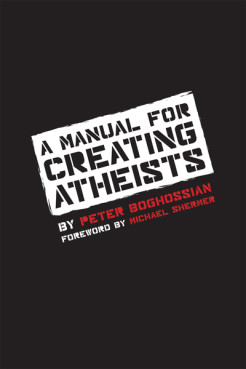 As the ranks of the religiously unaffiliated continue to grow in America, so, too, do efforts to evangelize non-belief. Speaking to this drive is the recent popularity of “A Manual for Creating Atheists,” in which author Peter Boghossian compares faith to a drug addiction and provides strategies to help non-religious people “de-convert” their religious family and friends.
As the ranks of the religiously unaffiliated continue to grow in America, so, too, do efforts to evangelize non-belief. Speaking to this drive is the recent popularity of “A Manual for Creating Atheists,” in which author Peter Boghossian compares faith to a drug addiction and provides strategies to help non-religious people “de-convert” their religious family and friends.
Boghossian’s work and those like it certainly pit non-believers against believers, but do most non-religious Americans really view faith groups with hostility? PRRI’s 2013 American Values Survey offers some answers by asking how all Americans, including the roughly 1-in-5 (18 percent) who identify as religiously unaffiliated, feel toward a variety of different religious traditions. Using a “feeling thermometer,” a scale that runs from 1 to 100 where 1 indicates very cool feelings and 100 indicates very warm feelings, religiously unaffiliated Americans report feelings ranging from fairly cool to decidedly warm toward a range of major religious groups in the United States.
Not surprisingly, religiously unaffiliated Americans report warm feelings toward non-religious people (77) and atheists (71). They give similarly high marks to Jews (70), but take a fairly neutral position toward Muslims (52). Views of most Christian groups are also more ambivalent than negative. The unaffiliated have slightly warm feelings toward Catholics (54) and Christians overall (51). The groups that fare worst in the group’s estimation are evangelical Christians (34) and the Catholic Church (36), both of which draw out very cool feelings from religiously unaffiliated Americans.
Americans overall have a different feelings profile toward religious groups in the country today. While their feelings toward Jews (68) are roughly similar to the religiously unaffiliated, Americans overall have substantially more negative views of Muslims (42), atheists (43) and non-religious people (56). Interestingly, while unaffiliated Americans view non-religious people and atheists about the same, Americans overall have decidedly more positive views of the non-religious than they do of atheists. The general population is also significantly more likely than the religiously unaffiliated to report warm feelings toward Christians (75), Catholics (65), the Catholic Church (56) and evangelical Christians (57).
All told, religiously unaffiliated Americans discern significant differences among religious groups in the country today, and the overall neutral feelings Americans hold toward religious groups do not seem to foretell a conflict between the religious and non-religious.